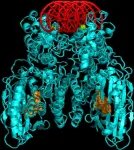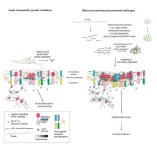(Press-News.org) Clocking up high weekly levels of moderate to vigorous intensity physical activity is linked to a lower risk of developing chronic kidney disease in overweight/obese people with type 2 diabetes, finds research published online in the British Journal of Sports Medicine.
But boosting the weekly tally by just over an hour is linked to a 33% reduction in risk, with the effects apparent for bouts lasting above or below 10 minutes at a time, the findings indicate.
Diabetes is the leading cause of chronic kidney disease, accounting for 30–50% of all such cases. Diabetes plus chronic kidney disease is associated with a 10-fold or greater increase in the risk of death from any cause compared with diabetes alone, point out the researchers.
Over the short term, the evidence shows that exercise improves kidney function in people with type 2 diabetes, but it’s not clear what the benefits might be over the longer term, or whether these are cumulative, and/or dependent on session length, say the researchers.
To try and find out, they did a secondary analysis of data from the US Look AHEAD trial. This was a multicentre, randomised controlled trial that compared the cardiovascular outcomes of an intensive lifestyle intervention with standard diabetes support and education in 5145 overweight/obese adults with type 2 diabetes.
The current analysis was restricted to an activity tracker study carried out at 8 of the 16 trial sites, involving 1746 Look AHEAD participants with an average age of 58. More than half (59%;1025) were women.
Levels of moderate to vigorous physical activity were measured at the start of the study, then 1, 4, and 8 years later, using an activity tracker to assess the potential impact on progression to chronic kidney, or end stage, disease.
Chronic kidney disease was defined as a deterioration of at least 30% in the estimated glomerular filtration rate (eGFR)---the rate at which kidneys remove waste and extra water from blood to make urine—to less than 60 ml/min.
The average total weekly tally of moderate to vigorous physical activity was 329 mins; the amount accumulated in bouts of less than 10 minutes, 267; and the amount accumulated in bouts of 10 or more was 41.
During an average monitoring period of 12 years, around 1 in 3 (567) participants progressed to chronic kidney disease.
Those who clocked up the most moderate to vigorous physical activity every week of 329 to 469 mins were significantly less likely to progress to chronic kidney disease than those clocking up the least—under 220 mins.
Overall, a higher cumulative weekly average was associated with a 9% lower risk for every 100 mins, and with a 19% lower risk if achieved in bouts lasting at least 10 mins at a time.
And boosting the weekly tally by at least an hour (63 mins +) over the course of the first 4 years of the study was associated with a 33% lower risk compared with the largest recorded decrease of 198 mins/week.
And among the weekly ‘improvers’, a lower risk of progression was observed for physical activity bouts lasting both above and below 10 minutes, the findings showed.
This is an observational study, and as such, can’t establish cause. And the researchers acknowledge that the study participants were highly motivated so may not be broadly representative of overweight/obese people with diabetes.
But they highlight: “These findings are consistent with evidence that regular [physical activity] has direct anti-inflammatory effects, and can promote glycaemic control, improve insulin sensitivity, blood pressure, lipid profiles and other metabolic and cardiovascular risk factors,all of which are associated with renal function.
“Furthermore, the association between [moderate to vigorous physical activity] and progression to [chronic kidney disease] was nearly linear, without an observable plateau or a clear threshold, suggesting that people with diabetes should be encouraged to engage in as much [of this exercise intensity] as they can tolerate to maximise the benefits.”
They recommend that overweight/obese adults with type 2 diabetes might want to do just over an hour (67 mins) of moderate intensity activity every day in the form of a brisk walk, cycling, jogging, or swimming to reach 469 mins every week to curb their risk of progression to chronic kidney disease.
END
High weekly physical activity levels linked to lower kidney disease risk in diabetes + overweight/obesity
Boosting weekly total by just over an hour linked to 33% lower risk; among ‘improvers’, effects evident for bouts lasting above or below 10 mins at a time
2024-02-07
ELSE PRESS RELEASES FROM THIS DATE:
Monterey Bay Aquarium study reveals how kelp forests persisted through the large 2014-2016 Pacific marine heatwave
2024-02-07
New research led by Monterey Bay Aquarium and the University of California, Santa Cruz, reveals that denser, and more sheltered, kelp forests can withstand serious stressors amid warming ocean temperatures. Published in Proceedings of the Royal Society B, the study also offers the first comprehensive assessment of how declines in kelp abundance affected marine algae, invertebrates, and fishes living in Monterey Bay. The study comes after a multi-year marine heatwave – the product of a 2014 ‘blob’ ...
Early drawing and building skills linked to enhanced education and behaviour in children
2024-02-07
Fine motor skills in young children are linked to better GCSE scores and fewer behavioural problems in childhood and adolescence, according to a new study from the University of Surrey and Birkbeck, University of London. The authors suggest that preschool fine motor skills, including drawing, folding paper and block building, may play an important role in the pathway between infancy and later educational and behavioural outcomes in primary and secondary school.
The study showed that fine motor skills ...
NLR researcher named Fellow of Society of Photo-Optical Instrumentation Engineers (SPIE)
2024-02-07
WASHINGTON – U.S. Naval Research Laboratory research physicist Lynda E. Busse, Ph.D., was named a Fellow of SPIE, the international society for optics and photonics, for outstanding technical contributions to the development of novel infrared (IR) optical materials and photonics devices.
Announced December 2023, the 47 new Fellows represent high-profile leaders in academia, industry, and government, and are being honored for their technical achievements as well as for their service to SPIE and the optics and photonics community. Dr. Busse was recognized along with many of the other new Fellows at the 2024 SPIE Photonics West Conference in San Francisco, California ...
A Filipino fruit dove, long part of Peabody collection, reveals its secrets
2024-02-06
In May 1953, Filipino ornithologist D. S. Rabor collected a single female fruit dove on the forested slopes of an active volcano on the Philippine island of Negros. The small apple green bird, which had yellow edgings on its wings and prominent circles of bare skin around its eyes, was unlike any other known pigeon species. In 1954, Rabor and Yale professor Dillon Ripley described the unique specimen as Ptilinopus arcanus, a name inspired by the Latin word for “secret.”
The Negros Fruit Dove, as it is commonly known, has never been ...
New study finds “sweet spot” for length of yarn-shaped supercapacitors
2024-02-06
As interest in wearable technology has surged, research into creating energy-storage devices that can be woven into textiles has also increased. Researchers at North Carolina State University have now identified a “sweet spot” at which the length of a threadlike energy storage technology called a “yarn-shaped supercapacitor” (YSC) yields the highest and most efficient flow of energy per unit length.
“When it comes to the length of the YSC, it’s a tradeoff between power and energy,” said Wei ...
New approach to tackling bacterial infections identified
2024-02-06
New York, NY (February 6, 2024)—Researchers at the Icahn School of Medicine at Mount Sinai have identified a new approach to controlling bacterial infections. The findings were described in the February 6 online issue of Nature Structural & Molecular Biology [DOI # 10.1038/s41594-024-01220-x].
The team found a way to turn on a vital bacterial defense mechanism to fight and manage bacterial infections. The defense system, called cyclic oligonucleotide-based antiphage signaling system (CBASS), is a natural mechanism ...
Study: Using Nutrition Facts labels linked to healthier eating choices among eighth and 11th grade students
2024-02-06
Using the Nutrition Facts labels to make food choices is significantly associated with healthy eating among eighth and 11th grade students in Texas, although the proportion of students using nutrition labels to make their food choices is low, according to research from UTHealth Houston.
A study led by first author Christopher D. Pfledderer, PhD, MPH, assistant professor in the Department of Health Promotion and Behavioral Sciences at UTHealth Houston School of Public Health, and senior author Deanna Hoelscher, PhD, RDN, the John P. McGovern Professor in Health Promotion and regional dean of the ...
Researchers at UMass Amherst discover key to molecular mystery of how plants respond to changing conditions
2024-02-06
AMHERST, Mass. – A team of researchers from the University of Massachusetts Amherst recently published a pioneering study that answers a central question in biology: how do organisms rally a wide range of cellular processes when they encounter a change—either internally or in the external environment—to thrive in good times or survive the bad times? The research, focused on plants and published in Cell, identifies the interactions between four compounds: pectin, receptor proteins FERONIA and LLG1 and the signal RALF peptide. In particular, the team discovered that a molecular condensation process, called liquid-liquid phase separation, that ...
Patients with cancer who suffered a major adverse financial event more likely to be diagnosed with advanced stage disease
2024-02-06
New findings led by researchers at the American Cancer Society (ACS) and the National Cancer Institute (NCI) show more than one-third of cancer patients had a major adverse financial event – bankruptcy, lien, or eviction – before their cancer diagnosis. These patients with adverse financial events (AFEs) had a later-stage diagnosis compared with patients with no events. The findings are published today in the Journal of Clinical Oncology (JCO).
“Patients with a previous AFE not only face greater likelihood of more advanced cancer but also may encounter substantial barriers to receiving recommended care ...
Improving quality of life and sleep in people with memory problems without using drugs
2024-02-06
PHILADELPHIA (February 6, 2024) – A groundbreaking study from the University of Pennsylvania School of Nursing (Penn Nursing), recently published in Innovation in Aging, has shown promising results in improving the quality of life (QOL) and sleep quality in individuals living with memory problems. The research delves into the efficacy of a nonpharmacological approach in a trial known as the Healthy Patterns Sleep Program.
Nancy Hodgson, PhD, RN, FAAN, the Claire M. Fagin Leadership Professor in Nursing and Chair of Department of Biobehavioral Health ...
LAST 30 PRESS RELEASES:
Scientists discover why we know when to stop scratching an itch
A hidden reason inner ear cells die – and what it means for preventing hearing loss
Researchers discover how tuberculosis bacteria use a “stealth” mechanism to evade the immune system
New microscopy technique lets scientists see cells in unprecedented detail and color
Sometimes less is more: Scientists rethink how to pack medicine into tiny delivery capsules
Scientists build low-cost microscope to study living cells in zero gravity
The Biophysical Journal names Denis V. Titov the 2025 Paper of the Year-Early Career Investigator awardee
Scientists show how your body senses cold—and why menthol feels cool
Scientists deliver new molecule for getting DNA into cells
Study reveals insights about brain regions linked to OCD, informing potential treatments
Does ocean saltiness influence El Niño?
2026 Young Investigators: ONR celebrates new talent tackling warfighter challenges
Genetics help explain who gets the ‘telltale tingle’ from music, art and literature
Many Americans misunderstand medical aid in dying laws
Researchers publish landmark infectious disease study in ‘Science’
New NSF award supports innovative role-playing game approach to strengthening research security in academia
Kumar named to ACMA Emerging Leaders Program for 2026
AI language models could transform aquatic environmental risk assessment
New isotope tools reveal hidden pathways reshaping the global nitrogen cycle
Study reveals how antibiotic structure controls removal from water using biochar
Why chronic pain lasts longer in women: Immune cells offer clues
Toxic exposure creates epigenetic disease risk over 20 generations
More time spent on social media linked to steroid use intentions among boys and men
New study suggests a “kick it while it’s down” approach to cancer treatment could improve cure rates
Milken Institute, Ann Theodore Foundation launch new grant to support clinical trial for potential sarcoidosis treatment
New strategies boost effectiveness of CAR-NK therapy against cancer
Study: Adolescent cannabis use linked to doubling risk of psychotic and bipolar disorders
Invisible harms: drug-related deaths spike after hurricanes and tropical storms
Adolescent cannabis use and risk of psychotic, bipolar, depressive, and anxiety disorders
Anxiety, depression, and care barriers in adults with intellectual and developmental disabilities
[Press-News.org] High weekly physical activity levels linked to lower kidney disease risk in diabetes + overweight/obesityBoosting weekly total by just over an hour linked to 33% lower risk; among ‘improvers’, effects evident for bouts lasting above or below 10 mins at a time





